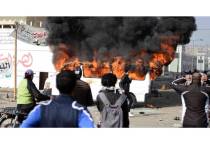 One year ago yesterday were signs in Egypt that all was not well with the Arab Spring. The change of government hadn’t seemed to have brought about the democratic entente hoped for. Of course, one year later and hindsight is a wonderful thing. The apparent ‘lack’ of change I questioned in the poem has been addressed by yet another regime change with the generals back in charge in Egypt.
One year ago yesterday were signs in Egypt that all was not well with the Arab Spring. The change of government hadn’t seemed to have brought about the democratic entente hoped for. Of course, one year later and hindsight is a wonderful thing. The apparent ‘lack’ of change I questioned in the poem has been addressed by yet another regime change with the generals back in charge in Egypt.
Arab Spring
Arab spring,
Mubarak out
Morsi elected in.
A football match
in Egypt’s larval hush,
an alleg-ed plot is hatched.
The exit gate is rushed,
over seventy piled dead,
their bodies lying trampled, crushed.
Football fans arrested.
Twenty-one condemned to die,
the new regime is being tested.
The people rise demanding why.
Violent, clashing riots in Port Said parts
and thirty more protestors fall and die.
Is this where the frozen Arab winter starts,
where the surging wasteland soul has lost its heart?
Mubarak out with Morsi in exchange.
Apparently no change.
26th January 2013 – headline from the BBC
Notes: “Egypt unrest: Death sentences over football riots spark violence”. At least 30 people have died in Port Said, officials say, in clashes sparked by the sentencing to death of 21 local people over football riots in Egypt. Ultras, the die-hard fans of al-Ahly, Egypt’s most successful club in Cairo, took to the streets of the capital to show satisfaction after 21 people were sentenced to death for their role in last February’s football violence. Ultras played a key role in the protests that overthrew President Mubarak. Many believe that Mubarak loyalists hatched a plot to target them at al-Ahly’s away match to Port Said’s al-Masry team and criticise police for failing to act. Thousands of people had taken to the streets on Friday to voice their opposition to the Islamist president, accusing him of betraying the revolution. The liberal opposition accuses Mr Morsi of being autocratic and driving through a new constitution that does not protect adequately freedom of expression or religion. (Technical note – poem constructed as a villanelle with tercets in terza rima style)
